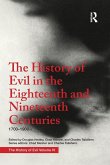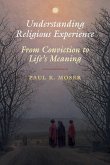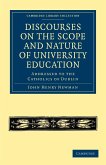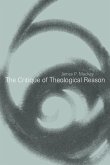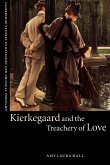Religious Thought in the Eighteenth Century
Illustrated from Writers of the Period
Herausgeber: Creed, John Martin; Boys Smith, John Sandwith
Religious Thought in the Eighteenth Century
Illustrated from Writers of the Period
Herausgeber: Creed, John Martin; Boys Smith, John Sandwith
- Broschiertes Buch
- Merkliste
- Auf die Merkliste
- Bewerten Bewerten
- Teilen
- Produkt teilen
- Produkterinnerung
- Produkterinnerung
Originally published in 1934, this book contains passages from a variety of well-known writers illustrating the changes and developments in thought concerning religion during the eighteenth century. Dealing primarily with the movement of thought in England, the text reveals the impact of Enlightenment ideas upon established religious principles and institutions. The selected writers are all given a brief biographical introduction. This book will be of value to anyone with an interest in eighteenth-century history and theology.
Andere Kunden interessierten sich auch für
![The History of Theology in the Eighteenth Century The History of Theology in the Eighteenth Century]() August TholuckThe History of Theology in the Eighteenth Century20,99 €
August TholuckThe History of Theology in the Eighteenth Century20,99 €![Eighteenth Report of the Proceedings of the Diocesan Church Society of New Brunswick, During the Year 1853 [microform] Eighteenth Report of the Proceedings of the Diocesan Church Society of New Brunswick, During the Year 1853 [microform]]() Eighteenth Report of the Proceedings of the Diocesan Church Society of New Brunswick, During the Year 1853 [microform]15,99 €
Eighteenth Report of the Proceedings of the Diocesan Church Society of New Brunswick, During the Year 1853 [microform]15,99 €![The History of Evil in the Eighteenth and Nineteenth Centuries The History of Evil in the Eighteenth and Nineteenth Centuries]() Douglas HedleyThe History of Evil in the Eighteenth and Nineteenth Centuries58,99 €
Douglas HedleyThe History of Evil in the Eighteenth and Nineteenth Centuries58,99 €![Understanding Religious Experience Understanding Religious Experience]() Paul K. MoserUnderstanding Religious Experience41,99 €
Paul K. MoserUnderstanding Religious Experience41,99 €![Discourses on the Scope and Nature of University Education Discourses on the Scope and Nature of University Education]() John Henry NewmanDiscourses on the Scope and Nature of University Education55,99 €
John Henry NewmanDiscourses on the Scope and Nature of University Education55,99 €![The Critique of Theological Reason The Critique of Theological Reason]() Mackey James P.The Critique of Theological Reason43,99 €
Mackey James P.The Critique of Theological Reason43,99 €![Kierkegaard and the Treachery of Love Kierkegaard and the Treachery of Love]() Amy Laura HallKierkegaard and the Treachery of Love50,99 €
Amy Laura HallKierkegaard and the Treachery of Love50,99 €-
-
-
Originally published in 1934, this book contains passages from a variety of well-known writers illustrating the changes and developments in thought concerning religion during the eighteenth century. Dealing primarily with the movement of thought in England, the text reveals the impact of Enlightenment ideas upon established religious principles and institutions. The selected writers are all given a brief biographical introduction. This book will be of value to anyone with an interest in eighteenth-century history and theology.
Produktdetails
- Produktdetails
- Verlag: Cambridge University Press
- Seitenzahl: 342
- Erscheinungstermin: 7. Februar 2013
- Englisch
- Abmessung: 216mm x 140mm x 20mm
- Gewicht: 483g
- ISBN-13: 9781107667808
- ISBN-10: 1107667801
- Artikelnr.: 37500921
- Herstellerkennzeichnung
- Libri GmbH
- Europaallee 1
- 36244 Bad Hersfeld
- gpsr@libri.de
- Verlag: Cambridge University Press
- Seitenzahl: 342
- Erscheinungstermin: 7. Februar 2013
- Englisch
- Abmessung: 216mm x 140mm x 20mm
- Gewicht: 483g
- ISBN-13: 9781107667808
- ISBN-10: 1107667801
- Artikelnr.: 37500921
- Herstellerkennzeichnung
- Libri GmbH
- Europaallee 1
- 36244 Bad Hersfeld
- gpsr@libri.de
Preface
Introduction
Part I. Natural Religion and Revelation: 1. The certainty of the existence of God John Locke
2. The reasonableness of Christianity John Locke
3. Of enthusiasm John Locke
4. Christianity not mysterious John Talmond
5. Natural religion without revelation Charles Blount
6. Why the true deist should not reject Christianity Samuel Clarke
7. Lack of universality not an objection to revelation Samuel Clarke
8. Christianity as old as the creation Matthew Todd
9. Nature and the artificer of nature William Paley
10. From nature to revelation William Paley
Part II. The Credentials of Revelation: 1. The certainty of the Christian religion proved by four rules Charles Leslie
2. Old testament prophecies restored with the help of the New Testament William Whiston
3. The gospel founded upon allegory Anthony Collins
4. The limitation of prophecy Thomas Sherlock
5. The resurrection an imposture Thomas Woolston
6. The apostles tried and acquitted Thomas Sherlock
7. Alleged miraculous powers of the ancient church explained Conyers Middleton
8. No testimony sufficient to establish a miracle David Hume
9. The truth of Christianity proved by internal marks of divinity Soame Jenyms
10. The guarantee of true testimony William Paley
Part III. The Grounds and Sufficiency of Natural Religion Considered: 1. The limits of reason William Law
2. The world as divine visual language George Berkeley
3. The authority of conscience Joseph Butler
4. The analogy of religion natural and revealed to the constitution and course of nature Joseph Butler
5. The arguments for natural religion reviewed David Hume
6. The origin of religion in human nature distinguished from its foundation in reason David Hume
Part IV. The Passing of the Age of Reason: 1. Salvation by faith: a gospel for sinners John Wesley
2. A sentimental faith Jean Jaques Rousseau
3. The truths of history and the truths of reason Gotthold Ephraim Lessing
4. Revelation as the education of the human race Gotthold Ephraim Lessing
5. The realm of nature and the realm of ends Immanuel Kant
6. The good will and the moral law Immanuel Kant
7. Faith in God, freedom, and immortality Immanuel Kant
8. Human nature radically bad Immanuel Kant
Part V. The Study of the Bible: 1. The necessity of a true history of scripture Spinoza
2. The composition of the old testament Richard Simon
3. The source of genesis Jean Astruc
4. The bible as literature Robert Lowth
5. The spirit of Hebrew poetry Johann Gottfried Herder
Part VI. The Church in its Relation to the State: 1. Toleration John Locke
2. The church not dependent upon the state Charles Leslie
3. Christ's kingdom not of this world Benjamin Hoadly
4. Church authority real though not absolute William Law
5. The alliance between church and state William Warburton
6. Establishment to be justified by its utility William Paley
7. Religion in consecration of the commonwealth Edmund Burke
8. That in a Christian commonwealth church and state are one thing Edmund Burke
9. Civil establishment of religion an innovation and an evil Joseph Priestley
Index.
Introduction
Part I. Natural Religion and Revelation: 1. The certainty of the existence of God John Locke
2. The reasonableness of Christianity John Locke
3. Of enthusiasm John Locke
4. Christianity not mysterious John Talmond
5. Natural religion without revelation Charles Blount
6. Why the true deist should not reject Christianity Samuel Clarke
7. Lack of universality not an objection to revelation Samuel Clarke
8. Christianity as old as the creation Matthew Todd
9. Nature and the artificer of nature William Paley
10. From nature to revelation William Paley
Part II. The Credentials of Revelation: 1. The certainty of the Christian religion proved by four rules Charles Leslie
2. Old testament prophecies restored with the help of the New Testament William Whiston
3. The gospel founded upon allegory Anthony Collins
4. The limitation of prophecy Thomas Sherlock
5. The resurrection an imposture Thomas Woolston
6. The apostles tried and acquitted Thomas Sherlock
7. Alleged miraculous powers of the ancient church explained Conyers Middleton
8. No testimony sufficient to establish a miracle David Hume
9. The truth of Christianity proved by internal marks of divinity Soame Jenyms
10. The guarantee of true testimony William Paley
Part III. The Grounds and Sufficiency of Natural Religion Considered: 1. The limits of reason William Law
2. The world as divine visual language George Berkeley
3. The authority of conscience Joseph Butler
4. The analogy of religion natural and revealed to the constitution and course of nature Joseph Butler
5. The arguments for natural religion reviewed David Hume
6. The origin of religion in human nature distinguished from its foundation in reason David Hume
Part IV. The Passing of the Age of Reason: 1. Salvation by faith: a gospel for sinners John Wesley
2. A sentimental faith Jean Jaques Rousseau
3. The truths of history and the truths of reason Gotthold Ephraim Lessing
4. Revelation as the education of the human race Gotthold Ephraim Lessing
5. The realm of nature and the realm of ends Immanuel Kant
6. The good will and the moral law Immanuel Kant
7. Faith in God, freedom, and immortality Immanuel Kant
8. Human nature radically bad Immanuel Kant
Part V. The Study of the Bible: 1. The necessity of a true history of scripture Spinoza
2. The composition of the old testament Richard Simon
3. The source of genesis Jean Astruc
4. The bible as literature Robert Lowth
5. The spirit of Hebrew poetry Johann Gottfried Herder
Part VI. The Church in its Relation to the State: 1. Toleration John Locke
2. The church not dependent upon the state Charles Leslie
3. Christ's kingdom not of this world Benjamin Hoadly
4. Church authority real though not absolute William Law
5. The alliance between church and state William Warburton
6. Establishment to be justified by its utility William Paley
7. Religion in consecration of the commonwealth Edmund Burke
8. That in a Christian commonwealth church and state are one thing Edmund Burke
9. Civil establishment of religion an innovation and an evil Joseph Priestley
Index.
Preface
Introduction
Part I. Natural Religion and Revelation: 1. The certainty of the existence of God John Locke
2. The reasonableness of Christianity John Locke
3. Of enthusiasm John Locke
4. Christianity not mysterious John Talmond
5. Natural religion without revelation Charles Blount
6. Why the true deist should not reject Christianity Samuel Clarke
7. Lack of universality not an objection to revelation Samuel Clarke
8. Christianity as old as the creation Matthew Todd
9. Nature and the artificer of nature William Paley
10. From nature to revelation William Paley
Part II. The Credentials of Revelation: 1. The certainty of the Christian religion proved by four rules Charles Leslie
2. Old testament prophecies restored with the help of the New Testament William Whiston
3. The gospel founded upon allegory Anthony Collins
4. The limitation of prophecy Thomas Sherlock
5. The resurrection an imposture Thomas Woolston
6. The apostles tried and acquitted Thomas Sherlock
7. Alleged miraculous powers of the ancient church explained Conyers Middleton
8. No testimony sufficient to establish a miracle David Hume
9. The truth of Christianity proved by internal marks of divinity Soame Jenyms
10. The guarantee of true testimony William Paley
Part III. The Grounds and Sufficiency of Natural Religion Considered: 1. The limits of reason William Law
2. The world as divine visual language George Berkeley
3. The authority of conscience Joseph Butler
4. The analogy of religion natural and revealed to the constitution and course of nature Joseph Butler
5. The arguments for natural religion reviewed David Hume
6. The origin of religion in human nature distinguished from its foundation in reason David Hume
Part IV. The Passing of the Age of Reason: 1. Salvation by faith: a gospel for sinners John Wesley
2. A sentimental faith Jean Jaques Rousseau
3. The truths of history and the truths of reason Gotthold Ephraim Lessing
4. Revelation as the education of the human race Gotthold Ephraim Lessing
5. The realm of nature and the realm of ends Immanuel Kant
6. The good will and the moral law Immanuel Kant
7. Faith in God, freedom, and immortality Immanuel Kant
8. Human nature radically bad Immanuel Kant
Part V. The Study of the Bible: 1. The necessity of a true history of scripture Spinoza
2. The composition of the old testament Richard Simon
3. The source of genesis Jean Astruc
4. The bible as literature Robert Lowth
5. The spirit of Hebrew poetry Johann Gottfried Herder
Part VI. The Church in its Relation to the State: 1. Toleration John Locke
2. The church not dependent upon the state Charles Leslie
3. Christ's kingdom not of this world Benjamin Hoadly
4. Church authority real though not absolute William Law
5. The alliance between church and state William Warburton
6. Establishment to be justified by its utility William Paley
7. Religion in consecration of the commonwealth Edmund Burke
8. That in a Christian commonwealth church and state are one thing Edmund Burke
9. Civil establishment of religion an innovation and an evil Joseph Priestley
Index.
Introduction
Part I. Natural Religion and Revelation: 1. The certainty of the existence of God John Locke
2. The reasonableness of Christianity John Locke
3. Of enthusiasm John Locke
4. Christianity not mysterious John Talmond
5. Natural religion without revelation Charles Blount
6. Why the true deist should not reject Christianity Samuel Clarke
7. Lack of universality not an objection to revelation Samuel Clarke
8. Christianity as old as the creation Matthew Todd
9. Nature and the artificer of nature William Paley
10. From nature to revelation William Paley
Part II. The Credentials of Revelation: 1. The certainty of the Christian religion proved by four rules Charles Leslie
2. Old testament prophecies restored with the help of the New Testament William Whiston
3. The gospel founded upon allegory Anthony Collins
4. The limitation of prophecy Thomas Sherlock
5. The resurrection an imposture Thomas Woolston
6. The apostles tried and acquitted Thomas Sherlock
7. Alleged miraculous powers of the ancient church explained Conyers Middleton
8. No testimony sufficient to establish a miracle David Hume
9. The truth of Christianity proved by internal marks of divinity Soame Jenyms
10. The guarantee of true testimony William Paley
Part III. The Grounds and Sufficiency of Natural Religion Considered: 1. The limits of reason William Law
2. The world as divine visual language George Berkeley
3. The authority of conscience Joseph Butler
4. The analogy of religion natural and revealed to the constitution and course of nature Joseph Butler
5. The arguments for natural religion reviewed David Hume
6. The origin of religion in human nature distinguished from its foundation in reason David Hume
Part IV. The Passing of the Age of Reason: 1. Salvation by faith: a gospel for sinners John Wesley
2. A sentimental faith Jean Jaques Rousseau
3. The truths of history and the truths of reason Gotthold Ephraim Lessing
4. Revelation as the education of the human race Gotthold Ephraim Lessing
5. The realm of nature and the realm of ends Immanuel Kant
6. The good will and the moral law Immanuel Kant
7. Faith in God, freedom, and immortality Immanuel Kant
8. Human nature radically bad Immanuel Kant
Part V. The Study of the Bible: 1. The necessity of a true history of scripture Spinoza
2. The composition of the old testament Richard Simon
3. The source of genesis Jean Astruc
4. The bible as literature Robert Lowth
5. The spirit of Hebrew poetry Johann Gottfried Herder
Part VI. The Church in its Relation to the State: 1. Toleration John Locke
2. The church not dependent upon the state Charles Leslie
3. Christ's kingdom not of this world Benjamin Hoadly
4. Church authority real though not absolute William Law
5. The alliance between church and state William Warburton
6. Establishment to be justified by its utility William Paley
7. Religion in consecration of the commonwealth Edmund Burke
8. That in a Christian commonwealth church and state are one thing Edmund Burke
9. Civil establishment of religion an innovation and an evil Joseph Priestley
Index.

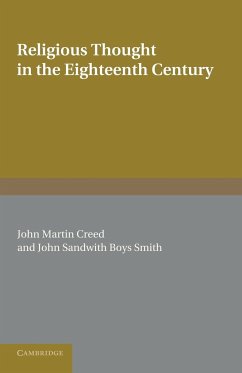

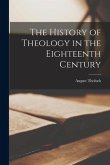
![Eighteenth Report of the Proceedings of the Diocesan Church Society of New Brunswick, During the Year 1853 [microform] Eighteenth Report of the Proceedings of the Diocesan Church Society of New Brunswick, During the Year 1853 [microform]](https://bilder.buecher.de/produkte/66/66197/66197834m.jpg)
